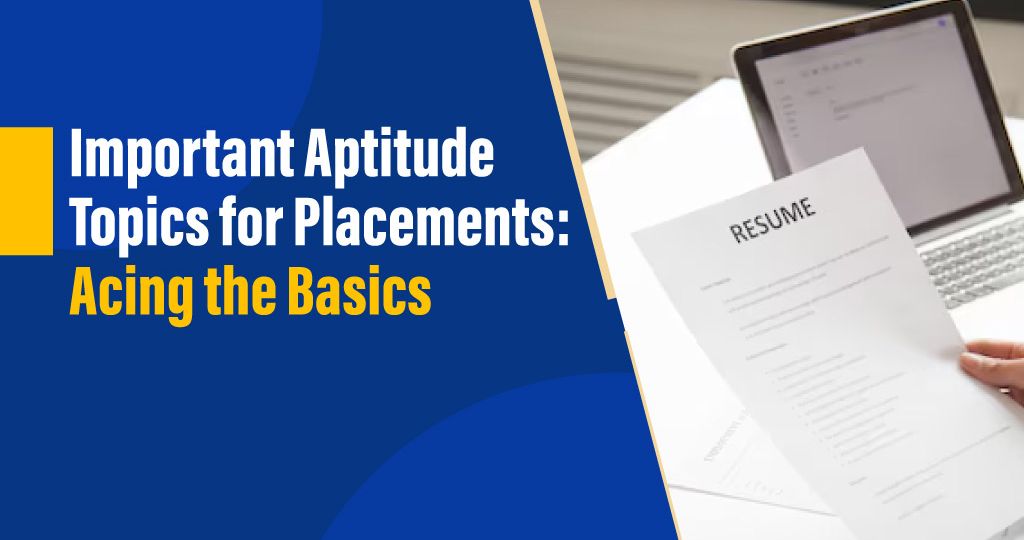Top Aptitude Topics to Master for Placement Success in 2025
Top Aptitude Topics to Master for Placement Success in 2025
Preparing for campus placements in 2025? Aptitude tests are a critical hurdle for engineering students, especially at institutions like Karpagam Institute of Technology, where competition is fierce. As of May 23, 2025, with India’s IT sector projected to grow by 8% annually (per a recent NASSCOM report), acing these tests can open doors to top companies. In this blog, we’ll break down the most important aptitude topics to focus on, share preparation tips, and help you build the confidence to excel. Whether you’re aiming for a tech giant or a startup, let’s get you placement-ready with these essential basics!
Why Aptitude Tests Matter for Placements
Aptitude tests evaluate your logical reasoning, numerical ability, and problem-solving skills—key traits employers seek in candidates. For students at Karpagam Institute of Technology, mastering these tests is crucial to stand out in placement drives. These assessments often serve as the first screening round, testing your ability to think critically under pressure. Excelling here can also complement your tech skills, especially if you’re exploring fields like AI. Learn more about tech trends in our post on The Rise of Artificial Intelligence in Engineering: Applications and Implications.
Key Aptitude Topics to Focus On
To crack placement tests, prioritize these essential aptitude topics:
- Quantitative Aptitude: Covers numbers, percentages, profit and loss, time and work, and ratios. Practice problems like calculating compound interest or solving speed-distance-time questions.
- Logical Reasoning: Includes puzzles, seating arrangements, blood relations, and syllogisms. These test your ability to analyze patterns and draw conclusions.
- Verbal Ability: Focus on reading comprehension, sentence correction, vocabulary, and grammar. Strong communication skills are a must for interviews.
- Data Interpretation: Involves interpreting charts, graphs, and tables to solve problems quickly—crucial for roles requiring data analysis.
- Abstract Reasoning: Tests your ability to identify patterns in shapes or sequences, often used to assess creative problem-solving.For more on analytical skills, check out Palm Vein Recognition Technology: An Insight.
Tips to Ace Aptitude Tests
Preparation is key to mastering these topics. Here are practical strategies:
- Practice Regularly: Solve sample questions daily to build speed and accuracy. Websites like IndiaBIX and PrepInsta offer free practice tests.
- Understand Concepts: Don’t just memorize formulas—grasp the logic behind topics like percentages or logical deductions.
- Time Management: Simulate test conditions to improve your speed, as most aptitude tests are time-bound.
- Review Mistakes: Analyze your errors to avoid repeating them, focusing on weak areas like data interpretation.
- Use Resources: Leverage books like R.S. Aggarwal’s “Quantitative Aptitude” and online platforms for mock tests.Curious about how AI can aid preparation? Explore What is Artificial Intelligence & What Are Some of Its Pros & Cons.
How These Topics Help in Tech Roles
Aptitude skills aren’t just for tests—they’re foundational for tech careers. Quantitative aptitude aids in algorithm optimization, logical reasoning enhances coding problem-solving, and data interpretation is vital for data-driven roles in AI and analytics. As India’s tech industry grows, these skills are increasingly valuable. Learn more about opportunities in The Scope of Artificial Intelligence in India: Opportunities & Future Prospects.
Start Your Preparation Today
Mastering these aptitude topics can give you a competitive edge in placements at Karpagam Institute of Technology. Start early, practice consistently, and focus on building a strong foundation. With dedication, you’ll be well-prepared to tackle any aptitude test and secure your dream job. For more career guidance, check out Top 10 Career Options In Artificial Intelligence And Data Science. Ready to ace your placements? Share your preparation tips in the comments—I’d love to hear from you!


Comments
Post a Comment